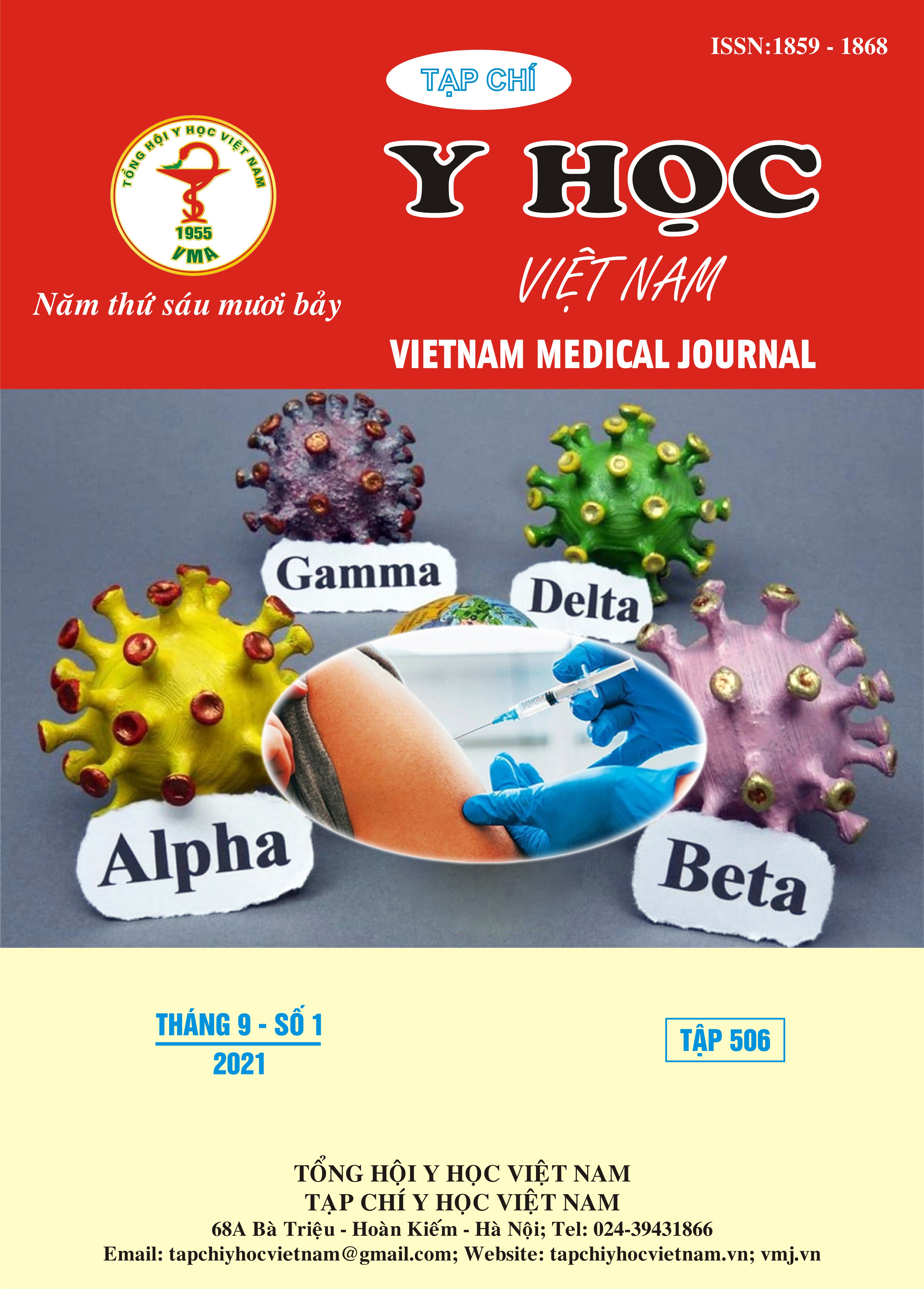INITIAL DESCRIPTION OF ANTIBODY LEVELS AGAINST SARS - COV - 2 VIRUS AFTER VACCINATION AGAINST COVID-19
Main Article Content
Abstract
The study observed the concentration of antibodies against SARS - CoV - 2 virus on 80 subjects, including 9 subjects who had not been vaccinated, 20 subjects received 1 dose of vaccine and 51 subjects received 2 doses with two objectives 1) Characterization of subjects using quantitative antibody testing after vaccination against Covid-19 2) Description of test results to quantify antibody levels against SARS - CoV - 2 after being vaccinated against Covid-19. Conclusion: Common adverse effects reported after vaccination with 1 dose and 2 doses were fever, chills, headache, body aches and pain and swelling at the injection site. The percentage of subjects with pain and swelling at the injection site accounted for the highest rate in both groups, this rate accounted for 60% in the group after 1st injection and 74,5% in the group after 2nd dose of vaccin. We recorded the rate of occurrence of human fatigue ranked second in both groups, common fever after the 2nd injection accounted for 26% and some unwanted side effects were less chill, headache. The results of IgG quantification of the study sample showed that 100% of the vaccinated groups had an immune response to SAR-COVID-2 right from the 1st dose and higher than the unvaccinated group at least 12 times (the vaccinated group of 1 dose) up to 71 times (group after 2 injections 2 weeks). Injecting 2 full doses of vaccine helped the body of research subjects achieve significantly higher antibody levels than when injecting 1 dose. The concentration of antibodies against the SARS-Covid-2 virus at the 3rd week after the 2nd injection was lower than the 2nd week after the 2nd injection. From the above analysis results, we indicated that vaccination against Covid-19 helps to produce antibodies against SARS-CoV-2 virus. However, the amount of this antibody varied between subjects and changed over time after vaccination. weeks, this concentration decreased by 2/3 after 2 weeks after administration the second dose.
Article Details
Keywords
Antibodies against SARS - CoV - 2, Covid-19 vaccine
References
2. Jimenez, M., N.E. Campillo, and M. Canelles, COVID-19 Vaccine Race: Analysis of Age-Dependent Immune Responses against SARS-CoV-2 Indicates that more than Just One Strategy May Be Needed. Curr Med Chem, 2021. 28(20): p. 3964-3979.
3. Widge, A.T., et al., Durability of Responses after SARS-CoV-2 mRNA-1273 Vaccination. N Engl J Med, 2021. 384(1): p. 80-82.
4. World Health, O., mRNA vaccines against COVID-19: Pfizer-BioNTech COVID-19 vaccine BNT162b2: prepared by the Strategic Advisory Group of Experts (SAGE) on immunization working group on COVID-19 vaccines, 22 December 2020. 2020, World Health Organization: Geneva.
5. Azzi, L., et al., Anti-SARS-CoV-2 RBD IgG responses in convalescent versus naïve BNT162b2 vaccine recipients. Vaccine, 2021. 39(18): p. 2489-2490.
6. Coughlin, M.M. and B.S. Prabhakar, Neutralizing human monoclonal antibodies to severe acute respiratory syndrome coronavirus: target, mechanism of action, and therapeutic potential. Rev Med Virol, 2012. 22(1): p. 2-17.
7. World Health, O., Interim recommendations for use of the ChAdOx1-S [recombinant] vaccine against COVID-19 (AstraZeneca COVID-19 vaccine AZD1222 Vaxzevria™, SII COVISHIELD™): interim guidance, first issued: 10 February 2021, updated: 21 April 2021, last updated: 30 July 2021. 2021, World Health Organization: Geneva.


